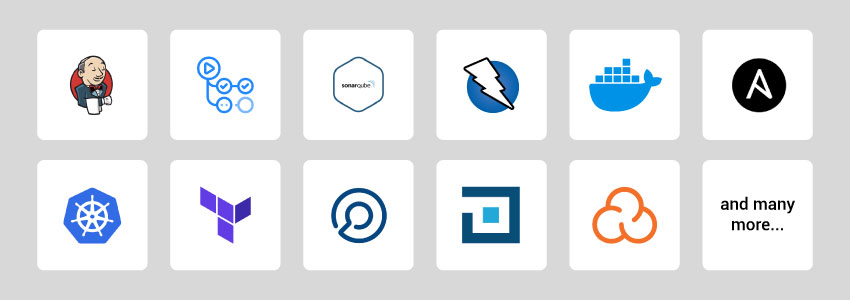Program Highlights
InfosecTrain’s Practical DevSecOps course provides a comprehensive, hands-on learning experience in implementing DevSecOps practices within Docker and Kubernetes environments, specifically emphasizing Spring Boot applications. This interactive practical DevSecOps training blends theoretical knowledge with immersive labs and a compelling Spring Boot application demonstration to ensure a profound understanding of DevSecOps principles and best practices through the latest DevSecOps course content.
40-Hour LIVE Instructor-Led Training
Scenario-based Practical Approach
6+ Intermediate Learning Projects Covered
Immersive Learning
Hands-on Projects for Each Tool
Learn from Industry Experts
Career Guidance and Mentorship
40+ Open-source Tools
Access to Recorded Sessions
Learning Schedule
- upcoming classes
- corporate training
- 1 on 1 training
| 03 May - 01 Jun | Online | Weekend | 19:00 - 23:00 IST | BATCH OPEN |
Why Choose Our Corporate Training Solution
- Upskill your team on the latest tech
- Highly customized solutions
- Free Training Needs Analysis
- Skill-specific training delivery
- Secure your organizations inside-out
Why Choose 1-on-1 Training
- Get personalized attention
- Customized content
- Learn at your dedicated hour
- Instant clarification of doubt
- Guaranteed to run
Can't Find a Suitable Schedule? Talk to Our Training Advisor
Introduction To The Basics
- What is DevOps?
- What is Continuous Integration and Continuous Deployment?
- DevOps vs. DevSecOps vs. Rugged DevOps
- Introduction to DevSecOps and Its Benefits
Introduction To The Tools
- Git/Github
- GitHub Actions/Jenkins
- OWASP ZAP
- Ansible
- Docker
- K8S
- Inspec
Software Component Analysis (SCA) in CI/CD Pipeline
- SCA Introduction
- Tools Used for SCA
- Demo/Hands-On (OWASP Dependency Checker/RetireJS/Safety)
- Intermediate Project- 1
SAST (Static Analysis) in CI/CD Pipeline
- SAST Introduction
- Tools Used for SAST
- Demo/Hands-On(SpotBugs,SonarQube,SonarCloud)
- Intermediate Project- 2
DAST (Dynamic Analysis) in CI/CD Pipeline
- DAST Introduction
- Tools Used for DAST
- Demo/Hands-On(OWASP ZAP)
- Intermediate Project- 3
Infrastructure As Code And Its Security
- IaaC Introduction
- Tools Used for IaaC
- Demo/Hands-On(Docker,Ansible,Terraform)
- Intermediate Project- 4
Compliance/Audit/Policy As Code
- Policy as a Code Introduction
- Tools Used for Compliance/Audit as Code
- Demo/Hands-On(Inspec/OpenScap)
- Intermediate Project- 5
Vulnerability Management
- Vulnerability Management Introduction
- Tools Used for Vulnerability Management
- Demo/Hands-On(Defect Dojo)
- Intermediate Project- 6
Final Capstone Project:
Integrating All the Tools in a Single CI/CD Pipeline
How We Help You Succeed
Vision
Goal
Skill-Building
Mentoring
Direction
Support
Success

Career Transformation
Projected increase in roles related to DevSecOps over the next decade.
Organizations implementing DevSecOps practices report
of Organizations: Plan to hire professionals certified in DevSecOps.
of Organizations: Committed to training existing staff on DevSecOps practices using open-source tools and frameworks.
Technology
Healthcare
Retail
Government
Manufacturing
Finance


Your Trusted Instructors
7+ Years Of Experience
Words Have Power

The DevSecOps training was insightful and well-structured. It effectively highlighted the integration of security into the development process emphasizing automation and collaboration. The hands-on exercises were practical and relevant enhancing our understanding.

The DevSecOps session was well-organized and comprehensive. The instructor delivered the material clearly, and the course content matched my expectations. The practical elements were particularly useful for understanding the subject.

Full credit to the mentor for making DevSecOps engaging and easy to understand. The course covered all key areas in depth and helped clarify complex topics with real-life examples and detailed explanations.

The course provided practical, hands-on experience in DevSecOps, allowing real-time application of the concepts. The practical exercises helped reinforce the theory, making it easier to implement in real-world projects.
Success Speaks Volumes
Get a Sample Certificate

Frequently Asked Questions
What is DevSecOps?
DevSecOps is a security practice that integrates security initiatives at every stage of the software development lifecycle (SDLC) to deliver robust and secure applications. It extends the DevOps practice, emphasizing collaboration between development and operations teams to shorten the software development cycle and improve software quality.
What is the goal of DevSecOps training?
DevSecOps training aims to equip participants with the knowledge, skills, and best practices required to integrate security into the entire software development and deployment process.
How does DevSecOps differ from traditional development and security practices?
DevSecOps differs from traditional development and security practices by promoting collaboration between teams, integrating security early in the development process, and automating security testing in CI/CD pipelines. It emphasizes shared responsibility for security, agility, and continuous improvement. In contrast, traditional practices often involve isolated silos, addressing security later in development, manual testing, and dedicated security teams, potentially hindering development speed.
Who should attend this training course?
This training course is ideal for:
- DevOps Engineers
- Security Engineers
- Software Engineers
- System Administrators
- Architects and Product Managers
- Developers
- Testers
- Cloud Architects
- Cloud Infrastructure Specialists
What prerequisites or prior knowledge are required to enroll in this course?
- Basic knowledge of Linux command-line usage, containerization concepts, and general DevOps practices.
- Understanding of Spring Boot application development and Jenkins is required.
- Technical background or B.E/B.Tech degree
What skills will I learn during the training?
Participants acquire the following skills:
- Deploying Spring Boot applications on Kubernetes
- Containerizing applications with Docker
- Setting up CI/CD pipelines with Jenkins and Kubernetes
- Conducting vulnerability scanning and testing
- Implementing Kubernetes networking and operation security
- Managing secrets using HashiCorp Vault.
Is programming knowledge required for DevSecOps training?
While having programming knowledge can benefit DevSecOps training, it is not always a strict requirement.
What tools and technologies are covered in Practical DevSecOps training?
The Practical DevSecOps training covers essential tools and technologies for integrating security into the DevOps pipeline. It includes SCM with Git/Github, secrets scanning with trufflehog, CI with Github Actions, containerization with Docker, and SCA tools like OWASP Dependency Checker, RetireJS, Safety/pip, and Snyk. SAST tools such as Sonarcloud, Brakeman, and FindBugs, DAST with OWASP ZAP, configuration management using Ansible, policy as code with Chef Inspec, and vulnerability management with Defect Dojo are also covered.
What additional bonus topics will be covered in the course related to security orchestration tools?
The bonus topics will cover security orchestration tools like DefectDojo, Archery, and Kubernetes-goat, offering participants insights into enhanced cybersecurity practices.
Will participants receive any course materials or resources for further learning?
Yes, participants will receive course materials and resources as reference materials for further learning and implementation.
What are the career prospects after completing Practical DevSecOps training?
The career prospects after completing Practical DevSecOps training include:
- DevSecOps Engineer/Senior DevSecOps Engineer
- Cloud DevSecOps Engineer
- DevSecOps System Administrator
- DevSecOps System Engineer
- DevSecOps Consultant
- DevSecOps Specialist
- DevSecOps CI/CD Engineer





 1800-843-7890 (India)
1800-843-7890 (India)